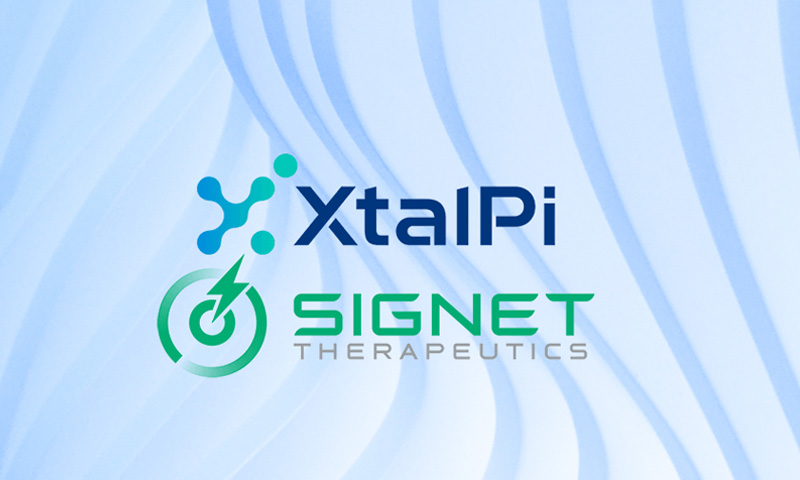SHENZHEN, China & BOSTON – Signet Therapeutics and XtalPi Inc., a physics-based, AI-powered drug R&D company, announced the expansion of their AI drug discovery collaboration to include a new first-in-class program against a novel cancer target identified by Signet. The two companies entered into a strategic collaboration in 2020 and successfully identified pre-clinical candidates for a new gastric cancer target in approximately six months. The follow-on project will continue to combine XtalPi’s AI drug discovery platform with Signet’s unique novel organoid disease models to generate pipeline candidates and advance them toward clinical trials.
A significant challenge to developing new therapeutics is the ability to expand the search beyond known structures and accurately screen through a copious supply of novel molecules to identify top candidates with a desirable drug property profile indicative of development potential. Pharmacodynamics is a key factor in lead optimization and drug design. However, traditional cell-based in vitro studies have considerable limitations in modeling drug effects in human body and often produce unreliable efficacy data that can lead to clinical failure.
XtalPi has developed an AI drug discovery workflow that integrates its algorithm-driven platform with expert domain knowledge and targeted small-batch experiments. This three-pronged approach can generate novel scaffolds beyond the conventional boundaries of known chemical space and predict molecular behaviors as well as important physicochemical and pharmaceutical properties with enhanced accuracy. The generative and prediction models continue to improve their outcome through iterations in a closed-loop feedback process, with insights from XtalPi’s team of medicinal chemists and high-quality data from its high-throughput wet lab, until promising candidates are validated in experiments. This workflow has been shown to substantially cut down the research time, costs, and experiments needed between target identification and IND-enabling experiments.
Signet Therapeutics was founded by scientists from Dana-Farber/Harvard Cancer Center, with extensive experience and unique expertise in oncology research. Using real-world cancer genomics data, the Signet team developed novel organoid disease models specific to cancer subtypes that simulate the unique 3D environment of organ tissues, yielding data with much higher clinical relevance. The two companies’ first collaboration successfully combined XtalPi’s AI-powered one-stop drug discovery capabilities with Signet’s insight and functional biology platform and identified novel molecules with superior in vitro performance that are now quickly advancing toward clinical trials.
Building upon existing success, the two companies will continue to apply the tried-and-true collaboration model of “AI drug discovery + novel disease models”. XtalPi’s AI platform will generate an extra-large chemical space containing millions of molecules with high binding affinity to the cancer target discovered by Signet. After assessing these molecules by their predicted key drug properties such as selectivity, drug-likeness, novelty, and synthesizability, a small batch of top-ranking molecules is synthesized in XtalPi’s lab and passed on to Signet’s platform for biological and functional evaluations using its novel disease models. XtalPi will then use the data from organoid-based and biochemistry tests to further finetune its AI models and recommend increasingly potent drug candidates. Through such Design-Make-Test-Analyze cycles, XtalPi’s AI platform and team of medicinal chemists work together to zero-in on molecules of strong bioactivity and a balanced drug property profile with minimal synthetization experiments.
Dr. Shuhao Wen, XtalPi’s co-founder and chairman, says, “We are excited to expand our collaboration with Signet, which allows us to develop XtalPi’s AI platform into new application areas and accelerate the growth and progression of Signet’s first-in-class pipeline to provide much-needed treatment options for cancer patients worldwide. XtalPi aspires to be a strong partner for innovative biotech companies like Signet and empower the quick translation of new biological discoveries into promising new clinical candidates.”
“XtalPi’s AI drug discovery platform and Signet’s novel disease models platform are highly complementary,” says Dr. Haisheng Zhang, founder and CEO of Signet. “The value of XtalPi’s AI is not only reflected in its incredible efficiency, but more importantly, in the discovery of de-novo molecules with strong clinical potential, helping us reach milestones in record speed. We look forward to working closely with XtalPi as an important partner in developing our first-in-class pipeline and bringing forth more targeted drugs to underserved disease markets.”
About Signet Therapeutics
Signet Therapeutics is developing new medicines to improve the lives of patients diagnosed with cancer, especially those insensitive to chemotherapy and radiotherapy.
By strategically collaborating with XtalPi, we bring together the expertise of an AI-powered drug discovery platform and our unique novel disease models to discover and optimize promising new candidates for novel targeted cancer drugs. By taking these advantages, we hope to revolutionize traditional drug discovery for small molecules.



